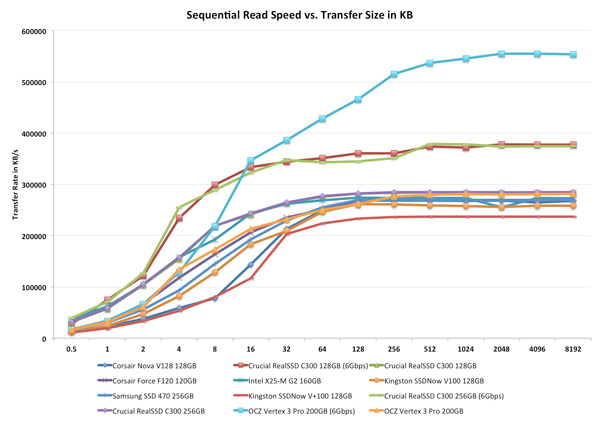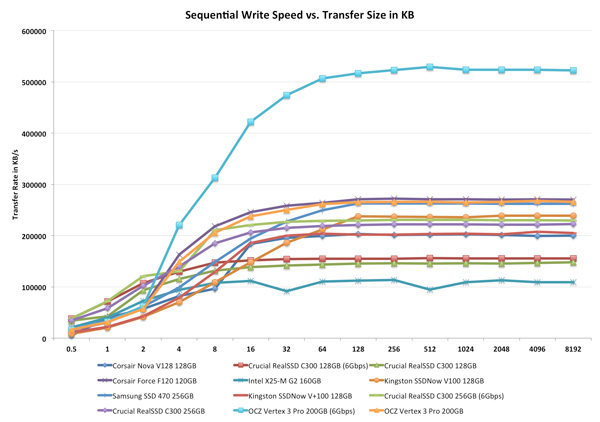OCZ Vertex 3 Pro Preview: The First SF-2500 SSD
by Anand Lal Shimpi on February 17, 2011 3:01 AM ESTPerformance vs. Transfer Size
All of our Iometer sequential tests happen at a queue depth of 1, which is indicative of a light desktop workload. It isn't too far fetched to see much higher queue depths on the desktop. The performance of these SSDs also greatly varies based on the size of the transfer. For this next test we turn to ATTO and run a sequential write over a 2GB span of LBAs at a queue depth of 4 and varying the size of the transfers.
On a 6Gbps SATA port the Vertex 3 Pro is unstoppable. For transfer sizes below 16KB it's actually a bit average, and definitely slower than the RealSSD C300. But once you hit 16KB and above, the performance is earth shattering. The gap at 128KB isn't even as big as it gets, we don't see leveling off of performance until 2048KB transfers.
The 3Gbps performance is pretty unimpressive. In fact, the Vertex 3 Pro actually comes in a bit slower than the SF-1200 based Corsair Force F120. If you're going to get the most out of this drive you had better have a good 6Gbps controller.
ATTO's writes are fully compressible, indicative of the sort of performance you'd get on applications/libraries/user data and not highly compressed multimedia files. Here the advantage is just hilarious. By the 8KB mark the Vertex 3 Pro is already faster than everything else, but by 128KB the gap is more of a chasm separating the 6Gbps Vertex 3 Pro from its competitors.
Over a 3Gbps interface the Vertex 3 Pro once again does well but still doesn't really differentiate itself from the SF-1200 based Force F120. Real world performance is probably a bit higher as most transfers aren't perfectly compressible, but again if you don't have a good 6Gbps interface (think Intel 6-series or AMD 8-series) then you probably should wait and upgrade your motherboard first.












144 Comments
View All Comments
abrar - Friday, February 18, 2011 - link
"In this particular drive the user (who happened to be me) wrote 1900GB to the drive (roughly 7.7GB per day over 8 months) and the SF-1200 controller in turn threw away 800GB and only wrote 1100GB to the flash. This includes garbage collection and all of the internal management stuff the controller does."how did you calculate this data ?
have you used any special software?
douglaswilliams - Friday, February 18, 2011 - link
Anand,Will these very fast read rates speed up virus scans?
Thank you for being technical and thorough,
Douglas
Qapa - Saturday, February 19, 2011 - link
ALL disk reads are this fast, so of course this will have an impact in virus scanning.But mostly, it will have an impact that your system is faster, although those resource hogs (virus scanning programs) are running - and yes, their bottleneck were reading the files from the disk.
semo - Saturday, February 19, 2011 - link
I've noticed that MSE is mostly limited by CPU and it isn't multithreaded so even worse notebooks where the CPU freq. might be lowerjoeld - Friday, February 18, 2011 - link
I don't believe any of the SF-1200 makers actually supported encryption on the drive, so the password was basically blank. Are the folks bringing the SF-2500 to market actually going to support disk passwords so that full-disk encryption requirements for laptops will be met? Software based full disk encryption is just too slow and flawed when paired with SSD drives...faster - Saturday, February 19, 2011 - link
Props to OCZ for leading the performance market on multiple levels.Looking at the prices of these new high performance SSDs, including the upcoming offerings from Intel, the OCZ Revodrive X2 is looking like a value. With Revodrive's read/write of 740/720, even this next generation of drives doesn't even come close. Now that newegg sells the 240GB x2, on sale, for $540 ($679 not on sale), it is a better bang for the buck than the new drives. The revodrive is a product that has been out for a while and is available right now. If you have the open PCIe slot, it seems like a no-brainer to pick the X2.
croc - Sunday, February 20, 2011 - link
Sadly, (well maybe not so sadly) we Aussies are not allowed gun ownership. There are exceptions, but generally not... So the final conclusion, "2011 may be the year to finally pull the trigger." does not really apply. However, maybe the right year to finally purchase an SSD, time (and further testing) will tell.MamiyaOtaru - Monday, February 21, 2011 - link
time doesn't "tell" anything. It's an abstract concept. I mean if you're going to take issue with idioms..Qapa - Sunday, February 20, 2011 - link
It would also be interesting to have in the benchs:- 1 "normal" 7200 HDD
- 1 "normal" 5400 laptop HDD
This would be interesting to compare since, most people do not own Velociraptors and this way we would be able to better know the system improvement on buying an SSD, and convincing other people - like our bosses - to upgrade our computers at work as well :)
compvter - Monday, February 21, 2011 - link
@faster Thats because they have two (old) sf controllers in the card. Think about the speeds they get with two of these (sf-2000 family) i would guess it will be around 1GB/s (read&write). At least current revodrives lack trim support so, that might be deal breaker for some ppl.